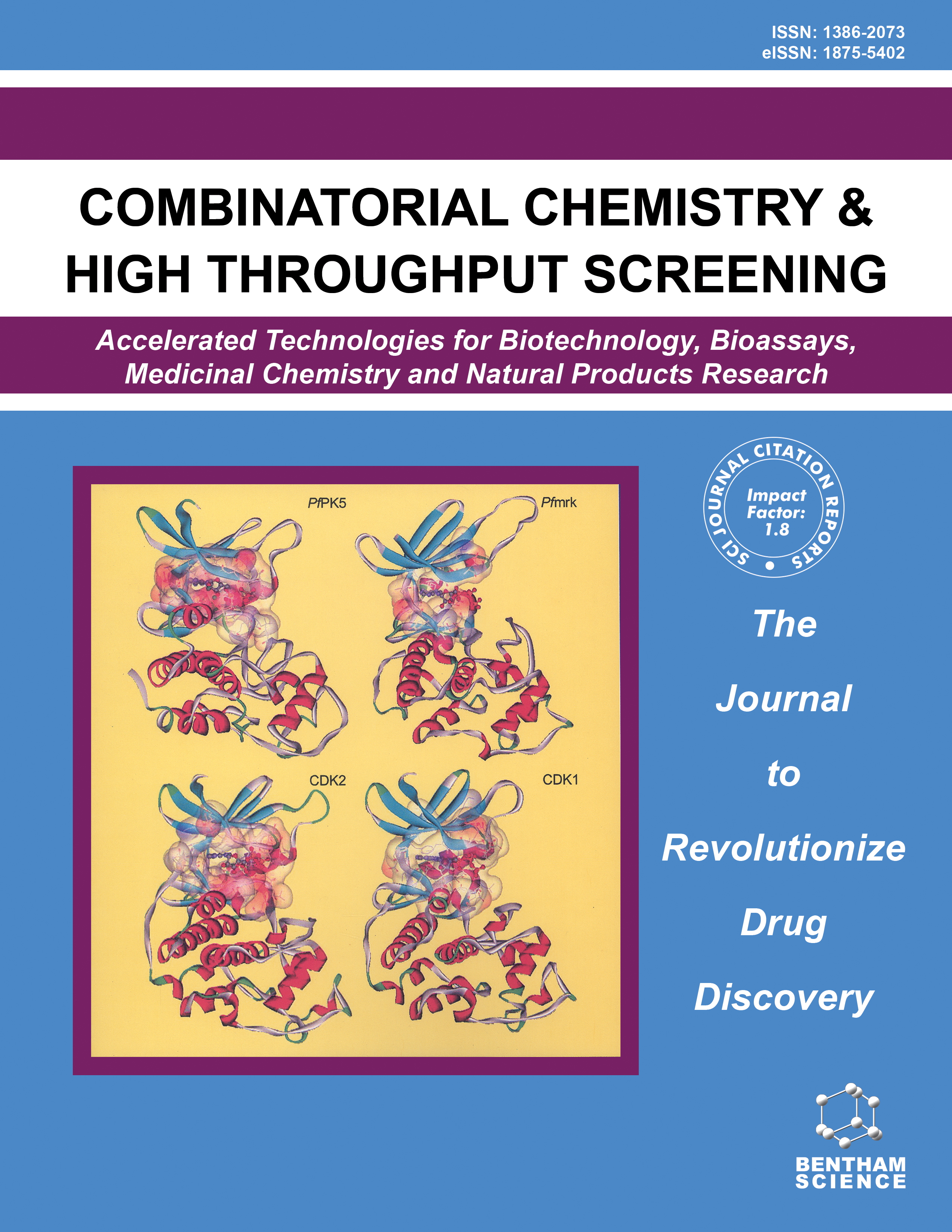Combinatorial Chemistry & High Throughput Screening - Volume 4, Issue 1, 2001
Volume 4, Issue 1, 2001
-
-
The Multicomponent Reactions and their Libraries for Natural and Preparative Chemistry
More LessIt was recently recognized that three different types of multi-component reactions (MCRs) exist. In preparative chemistry, the MCRs of type II form their products particularly efficiently. These reactions correspond to equilibria of educts and intermediate products, whose final products are formed practically irreversibly. In recent years, the four component reaction of the isocyanides (U-4CR) of type II and their unions with various reactions and MCRs have become an important industrial process for preparing products and their libraries. It has been demonstrated that all conceivable collections of U-4CR educts can be converted into the corresponding products. In the usual chemical reactions, only the substituents of the products can be varied, whereas the U-4CR and related reactions can also produce skeletally different types of products with diverse substituents. The preparative advantages of forming products by the one-pot MCRs and the great variety of the possible products are illustrated in this review.
-
-
-
Recent Developments in the Combinatorial Synthesis of Nitrogen Heterocycles Using Solid Phase Technology
More LessAuthors: P.M.S. Chauhan and S.K. SrivastavaRecognizing the potential of combinatorial chemistry to accelerate drug discovery and development, most pharmaceutical and related industries are seriously looking towardcombinatorial synthesis of compounds in order to facilitate the identification of ‘lead’ molecules. In particular, solid phase synthesis is the core technology for combinatorial chemistry and is widely used for generating libraries of structurally related compounds. Since many drugs contain the nitrogen heterocylic component and since heterocycles posses a high order of structural diversity, a precise overview of recent progress in the combinatorial synthesis of nitrogen heterocycles using solid phase methodology would be useful. Since the progress in solid phase synthesis of organic molecules has been reviewed regularly from 1992 to 1998, only the development of solid phase combinatorial synthetic approaches of small nitrogen heterocylces since 1999 will be reviewed here. This review describes the solid phase synthesis of azepanes, benzodiazepines, benzimidazoles, benzothiazepines, cinnolines, indolizines, beta lactams, oxazepins, oxazoles including benzisooxazoles, hydantoins, piperidines, pyrimidines, pyrazolones, quinolones, trizolopyridazines and thiazoles.
-
-
-
Dynamic Combinatorial Chemistry
More LessDynamic combinatorial chemistry is based on the reversible combination of initial building blocks to form dynamic combinatorial libraries. It has recently emerged as an efficient strategy to detect and to evaluate affinity between the library products and a target molecule. In this review, examples from various fields of chemistry and biochemistry are presented and extensively discussed. The last section deals with the practical aspects for implementing this approach.
-
-
-
Antigenic and Immunogenic Phage Displayed Mimotopes as Substitute Antigens Applications and Limitations
More LessAuthors: S. deroo and C.P. MullerThe most exciting potential of phage displayed peptide libraries is to obtain small peptide molecules that mimic an antigen, at least with respect to a particular epitope. In addition to their interest as research tools, such mimotopes could in principle be useful as diagnostic tools or for eliciting antibodies to a predefined epitope. However, the reduction of the phage insert sequence to a short peptide that can compete with the antigenic and in particular with the immunogenic properties of the natural antigen faces considerable difficulties. This review assesses critically the antigenicity of phage displayed peptides as free peptides and in different molecular environments. The difficulties to use mimotopes to induce antibodies that bind to the natural antigen (crossreactive immunogenicity) and the considerable discrepancy between antigenicity and immunogenicity of phage-derived peptides are discussed. Peptides selected with antibodies from phage displayed random peptide libraries have raised considerable expectations as low molecular weight substitutes of the natural antigen. This review will focus on the results of phage displayed random peptide libraries screened with antibodies specific for proteins, carbohydrates and nucleic acids and critically examine how the above expectations have been met.
-
-
-
Solid Phase Synthesis of 4-Hydroxycinnamic Acid and its Derivatives for Potential Use in Combinatorial Chemistry A Novel Route for the Synthesis of 4-Hydroxycinnamoyl Coenzyme A and NMDA Receptor Antagonists
More LessAuthors: B.G. McIntyre, F.M. Bermejo, S.K. Srivastava, S.M. Husbands, J.W. Lewis, J. Crosby and T.J. SimpsonSynthesis of 4-hydroxycinnamic acid 6 and its N-hydroxysuccinimide ester 8 has been carried out in high yield on solid support. Further development allowed the synthesis of 4-hydroxycinnamoyl CoA 1 in excellent overall yield. The utility of solid phase as a method for the synthesis of 4-hydroxycinnamic acid derivatives was demonstrated by the synthesis of a number of compounds including the NMDA receptor antagonists, N-(phenylalkyl)cinnamides 9 and 10.
-
Volumes & issues
-
Volume 28 (2025)
-
Volume 27 (2024)
-
Volume 26 (2023)
-
Volume 25 (2022)
-
Volume 24 (2021)
-
Volume 23 (2020)
-
Volume 22 (2019)
-
Volume 21 (2018)
-
Volume 20 (2017)
-
Volume 19 (2016)
-
Volume 18 (2015)
-
Volume 17 (2014)
-
Volume 16 (2013)
-
Volume 15 (2012)
-
Volume 14 (2011)
-
Volume 13 (2010)
-
Volume 12 (2009)
-
Volume 11 (2008)
-
Volume 10 (2007)
-
Volume 9 (2006)
-
Volume 8 (2005)
-
Volume 7 (2004)
-
Volume 6 (2003)
-
Volume 5 (2002)
-
Volume 4 (2001)
-
Volume 3 (2000)
Most Read This Month

Most Cited Most Cited RSS feed
-
-
Label-Free Detection of Biomolecular Interactions Using BioLayer Interferometry for Kinetic Characterization
Authors: Joy Concepcion, Krista Witte, Charles Wartchow, Sae Choo, Danfeng Yao, Henrik Persson, Jing Wei, Pu Li, Bettina Heidecker, Weilei Ma, Ram Varma, Lian-She Zhao, Donald Perillat, Greg Carricato, Michael Recknor, Kevin Du, Huddee Ho, Tim Ellis, Juan Gamez, Michael Howes, Janette Phi-Wilson, Scott Lockard, Robert Zuk and Hong Tan
-
-
- More Less

